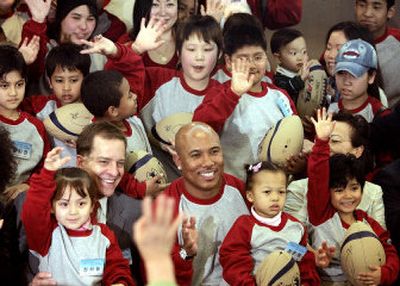Korean-born NFL pro welcomed home

SEOUL, S. Korea – Chang Ye Eu, a sinewy 19-year-old, doesn’t know the difference between a field goal and first down. But when she heard that Pittsburgh Steelers wide receiver and Super Bowl most valuable player Hines Ward was returning this week to the nation of his birth, she could not fight back tears of joy.
A Korean-African American, Ward won instant fame here following his Super Bowl success, becoming a national hero as well as a rare inspiration for Chang and tens of thousands of other mixed-race Koreans who have faced deeply entrenched discrimination.
On Ward’s triumphant return to South Korea, thousands of adoring fans have followed him, and President Roh Moo Hyun has feted him at the presidential palace. The visit has evolved into far more than one man’s quest to explore his roots.
In a country that is 99.5 percent ethnic Korean, Ward’s visit has sparked a broad reexamination of social prejudices against mixed-race Koreans, particularly those who, like Ward and Chang, are the children of Korean women and U.S. servicemen stationed here.
His achievements, Chang said, have offered Koreans like her a self-validating glimpse of their potential. “He has a Korean mother and an African American father,” Chang said. “I thought, wow, there’s someone like me, and look, he is successful! I wondered whether biracial kids could ever hope to make it to the top. But he did it.”
Editorials in major newspapers are calling for new attitudes toward mixed-race Koreans and running front-page stories highlighting egregious cases of discrimination. Lawmakers have proposed legislation to protect the rights of mixed-race Koreans. Government authorities are considering changes to school textbooks that describe South Korea as a “nation unified by one bloodline” to one that is “a multiethnic and multicultural” society.
“I want to meet with the mixed kids” of South Korea, Ward said when he arrived in Seoul last week, accompanied by his mother, Kim Young Hee, an Atlanta resident. “I want to give them my encouragement, because I know we all had something to overcome.”
In 1975, Kim married Ward’s father, an African American serviceman serving in South Korea. Ward was born in Seoul, and shortly afterward the young family moved to Georgia to begin a new life there.
But Ward’s parents separated before his second birthday, and his father was awarded custody. The courts deemed his mother, who had stayed on in the United States, unfit to raise a child because of her financial instability and weak command of English.
Six years later, his father sent him to live with her. At first, Ward said, he felt ashamed of her and things Korean. “I didn’t want my friends to see me with my mom,” he said at the airport. “She was just different.”
But as he grew up, he said, mother and son formed a strong bond – and Ward developed a profound respect for her and his Korean origins. Kim worked a series of minimum-wage jobs to support her son, always insisting that he concentrate on his studies as well as football.
“I think my mom had to overcome much more than what I had to,” he said.
Ward’s loyalty to his mother has been played big in the Korean press, which has linked it to Korean Confucian values that stress filial piety.
Racial discrimination in South Korea is basically xenophobia, said Yoon Young Chul, a professor of journalism and sociology at Seoul’s Yonsei University. “For thousands of years, Korea has been repeatedly invaded by surrounding neighboring countries,” he said. “So to protect ourselves, the concept of pure bloodlines was considered vital to the survival of the Korean race.”
No one knows how many racially Korean-American children are among South Korea’s 49 million people. But the Pearl S. Buck Foundation, a social service organization, has registered about 35,000 mixed-race children, not all of them with American parents.
All interracial Koreans tend to face social stigma, but many people here say the children of inter-Asian marriages receive the least hostility. Those with a Caucasian parent face discrimination, but the harshest treatment is reserved for sons and daughters of African American or dark-skinned parents – largely because they tend to be the most physically different.
Chang is hoping that the new generation of biracial children will have an easier time than she has.
“At school, kids refused to sit next to me,” she said. “They would say awful things to me like, ‘I’m going to turn black if I come too close you!’, acting as if my skin color was contagious.”
She began to cry quietly. “It was painful,” she said.
Chang entered the spotlight alongside Ward last week as her struggle with racism in South Korea became the focus of national media coverage. She is thrilled that a debate on the issue has opened – and that she is going to meet Ward at a restaurant in Seoul this weekend. But she remains unsure whether the publicity will lead to change.
Even now, she said, she hears whispers behind her back – the ones talking about her curly black hair, and those guessing at her nationality and parentage.
Now, she said: “Everyone’s asking me how I feel. I used to pray that there not be any more biracial kids born in Korea. But now we’ve got Hines Ward. He is our hope and my vision. Like he said, I believe that love has no color. I just hope that this will last.”